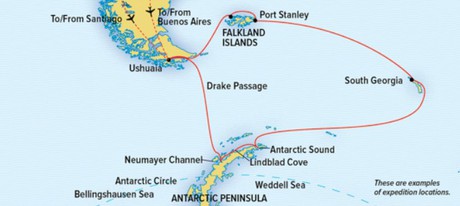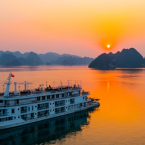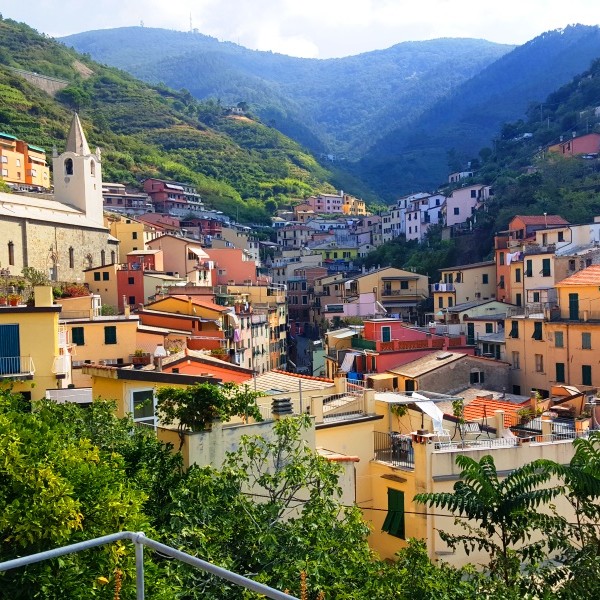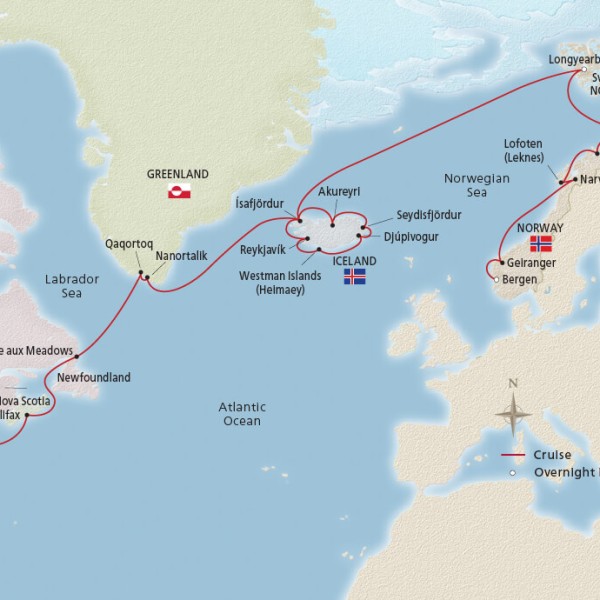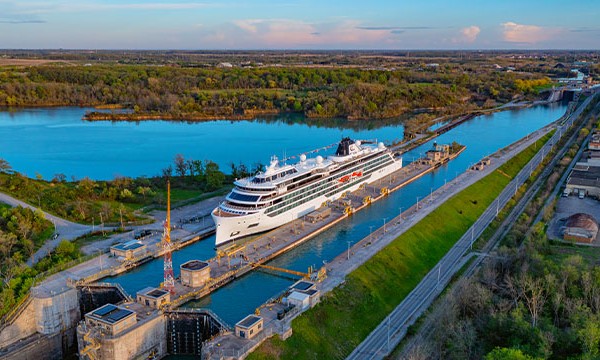This voyage has it all: the impossible beauty of the Antarctic ice, the vast king penguin colonies of South Georgia, and the Falklands’ amazing albatross colonies. Not even the mass migrations of Africa can rival the awesomeness of seeing a king penguin colony of tens of thousands individuals stretching as far as the eye can see. You’ll have other rare sightings here too: massive, in both senses of the word, herds of elephant seals: and a wandering albatross stretching its 11-foot wings. It’s the impossible beauty of an Antarctica trip exponentially increased by unimaginable numbers of animals. For most travelers, visiting Antarctica is a once-in-a-lifetime experience. So for those with the luxury of time, including the Falklands and South Georgia just makes sense. And it makes for a genuine experience of a lifetime.
Highlights
• Trace the story of Sir Ernest Shackleton’s fateful journey in 1914 aboard Endurance, and toast his gravesite in South Georgia
• See three distinct regions and benefit from our 50 years of experience here
• Early November departures on all ships offer the possibility to cross-country ski and showshoe across the frozen sea ice, conditions permitting
• Create incredible images of the ice and vast penguin colonies with help from a National Geographic photographer
Itinerary
DAY 1: Overnight Hotel in Buenos Aires (Explorer/Endurance) or Santiago (Resolution) Arrive in Buenos Aires (Explorer/Endurance) or Santiago (Resolution).
Settle into the Alvear Art Hotel (or similar, Explorer) or Alvear Icon Hotel (or similar, Endurance) before seeing the city’s Beaux-Arts palaces and the famous balcony associated with Eva Perón. Or check into the Mandarin Oriental Santiago (or similar, Resolution) before our guided overview of this vibrant city backed by the inspiring Andes. Discover sites like the Plaza de Armas and get a feel for the mix of old and new that makes this city so great. This area is excellent for photography! (L)
DAY 2: Fly to Ushuaia / Embark
Today we fly south to Ushuaia, the southernmost city in the world, where we meet our ship. Ushuaia’s spectacular setting, between the jagged peaks of the Darwin Range and the protected waters of the Beagle Channel, makes it an appropriately wild place to begin our journey to the White Continent and a great destination in its own right. While we’re there, we visit Tierra del Fuego National Park, where we can hike in a beautiful forest of southern beech, very much like those that covered Antarctica millions of years ago. Lunch will be served onboard a private catamaran while cruising the Beagle Channel, where we’ll be on the lookout for huge South American sea lions and birds like imperial cormorants. Residents of Ushuaia often call their small city ‘El Fin Del Mundo’, The End of the World, but for us it’s just the beginning. (B,L,D)
DAY 3: At Sea Crossing the Drake Passage
This 500-mile-wide strait between South America and the Antarctic Peninsula is one of the most famous bodies of water in the world. Sometimes ferocious, sometimes flat calm, the Drake is always a fascinating place in its own right. This part of the journey is our best opportunity to see gorgeous seabirds like the wandering albatross, and we might be lucky enough to encounter killer whales or rare species of dolphins. This is also a day to get to know our ship and prepare for the adventures ahead. Visit the Bridge (a great place to spot wildlife), have a relaxing massage, attend a talk about the biology of the penguins you’ll soon be seeing, or settle into a comfy chair in the observation lounge, look out over the waves and reflect on the incredible history of this fabled passage. If it does get a little rough, just take a couple of nice naps; we’ll be in Antarctica before you know it. (B,L,D)
DAY 4: Exploring Antarctica
Some ships that visit Antarctica just cruise by and have a look, but we have a very different way of experiencing this remarkable region. By taking full advantage of all the capabilities of our world-class expedition ship, we can offer a very intimate connection with this wildest of places, immersing ourselves in the polar world and filling all our senses with the beauty and excitement of the Antarctic. In the spirit of a genuine expedition, we always keep our schedule flexible so that we can take best advantage of every opportunity the White Continent offers us. We plan to be out daily, exploring in our Zodiacs, hiking at penguin colonies, discovering remote bays, photographing wildlife, and learning fascinating details from the naturalists and other experts who accompany us on every excursion. The Antarctic Peninsula stretches over 800 miles from north to south, a spine of craggy peaks cut by dozens of deep fjords. It’s an enormous region with many different faces and ever-changing weather, which is what makes Lindblad Expeditions’ long experience here so important. Over five decades of exploration have given us an unparalleled knowledge of the region, allowing us to respond to changing conditions, turn on a dime and select the optimal activity for each day. (B,L,D)
DAY 5: Exploring Antarctica
Ice! It’s probably the very first thing most people think about when the topic of Antarctica comes up, and once you’re here it never disappoints. From icebergs the size of islands to the fragile, nearly invisible layers glistening on the surface where the sea has just begun to freeze, from near-vertical glaciers pouring down the slopes of every mountain to the endless landscapes of sea ice, and frozen ocean stretching to the horizon in every direction, ice defines the Antarctic. You’ll get to know it up close and personal, hiking, kayaking and cruising in the Zodiacs through this frozen world. (B,L,D)
DAY 6: Exploring Antarctica
Our sturdy Zodiac landing craft are really the heart and soul of our explorations in the Antarctic. These tough, stable little motorized boats maneuver easily through ice-choked waters, getting us ashore safely in even the most remote and challenging locations. And simply cruising in the Zodiacs is just as much fun. What’s around the next corner? A leopard seal relaxing on an ice floe or a chance to photograph an exquisite arched iceberg that no one has ever seen before? We never know until we get there, but it’s always a thrill. (B,L,D)
DAY 7: Exploring Antarctica
Penguins, without any doubt, are the most popular residents of Antarctica, and we’ll have many chances to get to know them well. Their colonies are almost always close to the beach, so it’s very easy to get great photos. In the short Antarctic summer these amazing birds are always busy with the many tasks of breeding and raising their chicks, so every month brings something new. In November the adults are squabbling over the pebbles they use to build their nests. By late December the first chicks are tucked in under their parents, peeping out at the world. And in February the chicks have left their nests and are very active, learning to swim and getting ready to fend for themselves. (B,L,D)
DAY 8: Exploring Antarctica
Everywhere we go in the Antarctic we’re surrounded by opportunities to capture uniquely beautiful images with our cameras. Whether we are cruising past spectacular glaciers in the ship, getting close to seals in the Zodiacs or hiking around the penguin colonies, we are always in the company of an expert National Geographic photographer and a Lindblad photo instructor who share what they see and help us to perfect both the art and the technique of our own photography. The impossibly gorgeous blue in the heart of an iceberg, a penguin tenderly feeding its tiny chick or a glorious sunset over frozen ocean, shots like these surround us every day. Learning to capture these perfect moments is both a wonderful challenge and a huge thrill. (B,L,D)
DAY 9: Exploring Antarctica
Really exploring Antarctica also means simply relaxing and watching while our ships cruise through some of the most spectacular scenery on Earth. Grab a cup of cocoa and a comfortable seat in the Observation Lounge or visit the officers on the Bridge; bundle up and climb all the way up to the Monkey Deck for a really panoramic view or just kick back in your cabin and watch for seals on ice or whales blowing in the distance. We make transits of world-famous passages like the Lemaire Channel and Antarctic Sound, but we also visit equally amazing places that you’ve never heard of, yet! (B,L,D)
DAY 10-11: At Sea Toward South Georgia
Setting out from the South Shetland Islands to South Georgia, we are following in the wake of Sir Ernest Shackleton’s epic voyage in the James Caird, across 800 miles of the wild and lonely Scotia Sea. But we won’t be lonely at all—these waters are home to a large and growing population of whales, including fin whales, southern right whales and even blue whales, the largest animal on Earth. Albatross and petrels wing past the ship, providing us with another wonderful challenge for photography, while presentations from the expedition team help to prepare us for the mind-bending wildlife spectacles of South Georgia. Days at sea are not simply transits from one place to another; they are in their own right a very important part of this epic journey. The crossing from the Antarctic Peninsula to South Georgia gives us a chance to stop and breathe, to explore the amenities of the ship and to spend a little time contemplating all our new memories. Lifechanging experiences tend to pile up on one another in the Antarctic, so slow down a bit and let it all settle in. This is a great time to catch up with your journal, enjoy a rejuvenating massage, or download and review all those hundreds (or thousands!) of photos. Get some rest too, when we get to South Georgia it’s going to be go, go, go! (B,L,D)
DAY 12: South Georgia Island
Simply put, there is nowhere else in the world like South Georgia. Ninety miles long, dominated by a spine of jagged peaks and home to wildlife spectacles that are honestly hard to believe, it is one of the wildest and most beautiful places on the planet. Our days here will give us plenty of time to explore many facets of this unique sub-Antarctic island, including its storied history, rich ecology (you’ll probably be surprised by the green slopes of tussock grass below the glaciers) and the stunning scenery that surrounds us at every landing. (B,L,D)
DAY 13: South Georgia Island
King penguins, the second largest species in the world, are unquestionably the most iconic wildlife of South Georgia. Exact numbers are not known, but the largest single colony on the island may have as many as 500,000 of these amazing birds. Half a million birds! Nesting together on a single two-mile-long beach! It’s a sight that is genuinely inconceivable until you have experienced it in person. At the other end of the scale, king penguins are great birds to get to know as individuals. Strutting purposefully past our cameras on the beaches or coming and going in and out of the surf, they seem to regard us with a wonderful mixture of curiosity and disdain. (B,L,D)
DAY 14: South Georgia Island
For many, South Georgia evokes, more that anything, the epic adventures of Sir Ernest Shackleton, who reached the island after making the crossing from Elephant Island in the James Caird—still one of the most incredible small-boat journeys ever attempted. From Peggotty Bluff, where he began the arduous crossing of the glaciated spine of the island, to his quiet grave near the Grytviken whaling station, Shackleton’s spirit seems to be everywhere around the island. In very good conditions we may even be able to make a long hike up to the spot where he first heard the noon whistle from the Stromness Station and knew that rescue was close at hand at last. (B,L,D)
DAY 15: South Georgia Island
In the not-too-distant past, South Georgia was an important site for both whaling and sealing, but today things are very different. The contrast between watching from the ship while southern right whales feed below the blue face of a huge iceberg, and then hiking through the rusting remains of a whaling station later the same day, can be a powerfully moving experience and one that emphasizes the very positive changes that the island has seen in the last few decades. Invasive species have been removed, rare birds are growing more and more common, whales are returning in ever-greater numbers, and our own visits have become an important factor in this successful conservation. (B,L,D)
DAY 16: South Georgia Island
Every minute at South Georgia is another opportunity for truly life-changing experiences. Landing before dawn to see the pink light of sunrise touch the mountains over a king penguin colony. Quietly watching as a wandering albatross, with its 11-foot wingspan, settles onto her nest and thinking of endless miles of ocean that she has seen. Capturing incredible images of three-ton bull elephant seals jousting on a lonely beach. South Georgia is sometimes called “the Serengeti of the Southern Ocean”, but that doesn’t really even come close—this lonely island is unique in the world, so rich and so beautiful that it defies any comparison. (B,L,D)
DAY 17-18: At Sea Toward the Falkland Islands
Our first day at sea on the way to the Falkland Islands is another opportunity to think back over the adventures of the past few days and make preparations for those soon to come. Spend some time chatting about your latest images with the National Geographic photographer and learn to make them look their best in the digital darkroom. Put the finishing touches on your watercolor of that amazing iceberg or try to capture an albatross’s flight in a poem. Everyone needs to exhale a bit after a visit to South Georgia, so take a little time to explore the details of your own memories and share them with your shipmates. The bridge is the nerve center of the ship, in more ways than one. There’s always a congenial atmosphere there, whether you’ve come to ask one of the officers about navigation or just to sit and watch the world go by with binoculars in hand. The waters close to the Falkland Islands are rich with marine wildlife, so this is a great time to hang out with the naturalists and keep a watch for rare dolphins or another beautiful species of albatross. All new sightings go up on the white board for the day’s record! (B,L,D Daily)
DAY 19: Falkland Islands
Stanley, the bright, pretty capital of the Falkland Islands, is a wonderfully unexpected place: a charming outpost of British culture tucked into a small bay on the shore of these windswept islands in the far South Atlantic. Many Falkland Islanders still live in very traditional ways, and we’ll have a chance to visit a small farm to see some expert sheep shearing and learn about the best techniques for cutting blocks of peat for the fire. The rocky hills and white sand beaches outside town offer some excellent hikes, and afterwards a cup of tea or a pint at the Globe Tavern goes down very nicely. (B,L,D)
DAY 20: Falkland Islands
Everything we love about expedition travel seems to come together in the western Falkland Islands. Where else can you land on a beach tucked into a rocky cove, hike out across a rolling green pasture and suddenly find yourself at the crest of a sea cliff looking out over the South Atlantic surf? Just a few steps further and you’re standing at the edge of a breeding colony of black-browed albatross, so close that you can hear the wind on their wings as they swoop into land beside you. Take time to capture images of the rockhopper penguins and then it’s time to head back down to the settlement for a well-deserved farm tea—which means lots and lots and lots of delicious cakes, cookies and fresh scones! (B,L,D)
DAY 21: At Sea to Ushuaia, Argentina
The final day of our expedition takes us across the shallow waters of the Falklands Shelf, back to our starting point in Ushuaia. Attend presentations from the expedition staff on topics that help to sum up all the wonderful details of our experiences in the far south and spend some time on deck enjoying the seabirds and dolphins that make these seas their home. This is a day for contemplation as well. A time to think back over our adventures, reflect on what the Antarctic means to you, how it has changed you and what thoughts and feelings you’ll take back to share with those at home. The Antarctic stays with you. Sometime soon, at a moment in the midst of a stressful day, you’ll remember the feeling of the polar wind, the sight of waves crashing against the blue wall of an iceberg, and the sound of the penguins calling to their chicks. It’s a little bit of peace that you’ll carry with you always. (B,L,D)
DAY 22: Disembark Ushuaia / Fly to Buenos Aires (Explorer/Endurance) or Santiago (Resolution) / Home
Today we disembark in Ushuaia. Fly by private charter flight to Buenos Aires or Santiago and connect with your overnight flight home. (B,L)
Please Note:
Some departures may have a slightly modified itinerary. Please confirm departure and arrival cities with an Expedition Specialist before booking your flights.
Inclusions
• Voyage on board in selected cabin category
• All meals while on board
• Non alcoholic beverages
• Experienced expedition team and leader
• All excursions
• Zodiac and kayak exploration
• Snorkeling, including wetsuits, masks, fins & snorkel where relevant
• Lectures and presentations on board
Exclusions
• International and domestic flights unless otherwise stated
• Travel insurance
• Passport and visa costs if applicable
• Alcoholic beverages on board unless otherwise stated
• Gratuities unless otherwise stated
• Wifi on board
• Any items of a personal nature including laundry
WE 2023
Images Courtesy of Wild Earth Travel





